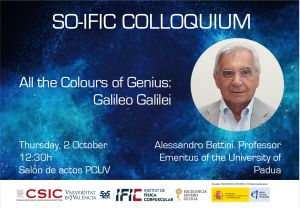From the telescope to wine: the many faces of Galileo in the upcoming SO-IFIC colloquium
The upcoming IFIC colloquium invites us to rediscover one of the most universal figures in the history of science: Galileo Galilei. His contributions to physics and astronomy, which earned him the title of founder of modern science, are universally recognized and have filled thousands of pages. However, the spectrum of his genius shines with many hues, like a rainbow: a restless mind, at times whimsical, always ready to challenge established ideas. Some of these colors remain little known, overshadowed by the dazzling brilliance of his discoveries.
This wealth of facets will be explored by Alessandro Bettini, emeritus professor at the University of Padua, on October 2 at 12:30 p.m. in the Assembly Hall (Salón de Actos) of the Main Building at the UV Science Park. During his talk, titled All the Colours of Genius: Galileo Galilei, Bettini will use the kaleidoscope of history to portray the many dimensions of the Tuscan genius: physicist, astronomer, mathematician, engineer, writer, philosopher, musician, literary critic, painter, lover, refined gourmet, wine pioneer and, not least, a true maledetto toscano, an irrepressible polemicist.
Bettini is a renowned experimental particle physicist with a top-level international career. He has participated in and led experiments at CERN and at the Gran Sasso National Laboratories (LNGS), with key contributions to hadron spectroscopy—such as the discovery of the first scalar resonance—as well as to studies of antiproton annihilation in charm quark physics, the investigation of vector bosons in the UA1 experiment, and the GERDA experiment on neutrinoless double beta decay.
Author of over 200 scientific publications and physics textbooks, he has also brought science closer to the general public through popular science books, including the recent Galileo Galilei, genio policromo. He has served as director of the Gran Sasso National Laboratories in Italy and the Canfranc Underground Laboratory in Spain, and held leadership positions at the Italian National Institute for Nuclear Physics (INFN) and international scientific bodies such as the OECD Global Science Forum. He is a member of the Galilean Academy of Sciences, Letters and Arts (Accademia Galileiana di Scienze, Lettere e Arti), the Italian Physical Society—of which he was vice president—and a Fellow of the European Physical Society.
The event will also be available online. More information here.
This colloquium is part of the CEX2023-001292-S grant, funded by MICIU/AEI/10.13039/501100011033.




















